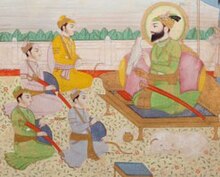Jujhar Singh
Sahibzada Baba Jujhar Singh Ji | |
|---|---|
ਜੁਝਾਰ ਸਿੰਘ, ਸਾਹਿਬਜ਼ਾਦਾ | |
 Detail of Sahibzada Jujhar Singh from a mural depicting Guru Gobind Singh and his four sons (the Sahibzadas) located within Takht Hazur Sahib | |
| Title | Sahibzada |
| Personal | |
| Born | 14 March 1691 Anandpur Sahib, Punjab |
| Died | 23 December 1704 (aged 13) |
| Cause of death | Killed in Action |
| Religion | Sikhism |
| Parents |
|
| Known for | Battle of Chamkaur |
| Relatives | Ajit Singh (half-brother Biologically)
Zorawar Singh (brother) Fateh Singh (brother) |

| Part of a series on |
| Sikhism |
|---|
 |
Jujhar Singh (Punjabi: ਸਾਹਿਬਜ਼ਾਦਾ ਜੁਝਾਰ ਸਿੰਘ, pronunciation: [säːɦɪbd͡ʒäːd̪ɛ d͡ʒʒjäːɝ sɪ́ŋgᵊ]; 9 April 1691 – 23 December 1704), the second son of Gobind Singh, was born to Mata Jito at Anandpur Sahib.[1] This event is now celebrated on April 9 each year according to the Nanakshahi Calendar.[2]
Biography
[edit]He died in battle during the Second Battle of Chamkaur Baba Jujhar Singh Ji was born on March 14, 1691, in Anandpur Sahib, Punjab. His parents were Mata Jito Ji and his Father was the 10 Sikh guru, Guru Gobind Singh Sahib Ji. Baba Jujhar Singh Ji was also the second son of Guru Gobind Singh Sahib Ji. He was only 14 when he met his martyrdom after watching his brother's death.[3]
Legacy
[edit]Sikh hagiographer, Rattan Singh Bhangu, compared Jujhar Singh's sacrifice at the Battle of Chamkaur to the death of Abhimanyu in the Mahabharata epic, as both fought and died defending their father.[3] He writes Jujhar Singh as thinking the following whilst engaging the Mughal forces in battle: "How can a son live while his father confronts death in battle?"[3]
Indian Prime Minister Narendra Modi has paid homage to the Chaar Sahibazde on various occasions, particularly during the celebration of their bravery and sacrifice on Veer Bal Diwas (Day of Brave Children). Veer Bal Diwas is observed in honour of the Chaar Sahibzaade, who are remembered greatly amongst Sikhs across the globe.[4]
See also
[edit]Notes
[edit]- ^ Ashok, Shamsher Singh. "JUJHAR SINGH, SAHIBZADA". Encyclopaedia of Sikhism. Punjabi University Punjabi. Retrieved 24 November 2015.
- ^ "SAHIBZADA JUJHAR SINGH (1691-1704)". www.sikh-history. Archived from the original on 7 November 2018.
- ^ a b c Fenech, Louis E. (2021). The Cherished Five in Sikh History. Oxford University Press. pp. 41–42. ISBN 9780197532843.
- ^ "Veer Bal Diwas 2022: History, significance and everything you need to know". India Today.
References
[edit]- Kuir Singh Gurbilds Pdtshdhi 10. Patiala, 1968
- Chhibbar, Kesar Singh, Rnnsdvalindma Dasdn Pdlshdhldn Kd. Chandigarh, 1972
- Gian Singh, Giani, Panth Prakdsh. Patiala, 1970
- Padam, Piara Singh, Char Sdhihidde. Patiala, 1970
- Macauliffe, Max Arthur, The Sikh Religion. Oxford, 1909
